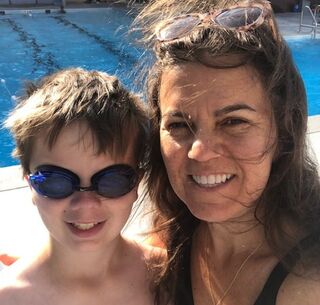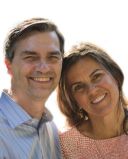Spirituality
How to Flourish at 50+
Focus on the "5 Fs" for a flourishing life
Posted June 10, 2021 Reviewed by Kaja Perina
Key points
- Spiritual strivings are more highly correlated with well-being measures than other types of yearnings.
- Loving relationships have been found to be the greatest predictor of aging well, according to the Harvard Grant Study.
- Being child-like and zestful is highly associated with living a happy and healthy life.

Having just celebrated another 50+ birthday, I ("Suzie") am savoring what I've learned over the years from the science of positive psychology about how to age well and live a flourishing life. While there is a mound of research on a variety of practices that may help us live a healthy and vibrant life over the years, I've broken it down into five things, or what I like to call the "5 Fs," that I do my best to practice daily to stay young at heart. They are as follows:
- Faith - Having a belief in God or something larger than yourself is key to aging well. In other words, finding a purpose that helps guide you and puts your life in perspective. Researchers have found that spirituality is linked to a number of human flourishing factors. Ken Pargament, professor emeritus of psychology at Bowling Green State University, defines spirituality as "the search for the sacred." Spirituality allows us to see the extraordinary in the ordinary. Pargament's research over several decades found that spiritual strivings are more highly associated with well-being measures than other types of yearnings. In fact, the world-renowned spirituality researcher found those who see their marriage as imbued with sacred qualities experience a more satisfying and stable marriage. And those who discover the sacred in many of areas of life experience greater psychological and physical well-being overall.
- Family & Friends - Relationships have been found to be the key determinant of happiness. In fact, eminent Harvard psychiatrist George Vaillant, who was at the helm of the Harvard Grant study, the longest running study on adult development, found that loving relationships were the key factor to aging well later in life. In brief, he found that warm and supportive bonds early in life with a parent or primary caregiver helped buffer against future stressful situations. And loving relationships formed later in life, namely with one's spouse, had the power to undo damaging effects of even the direst of childhoods. So no matter how you look at it building close relationships is crucial for our well-being and aging well.
- Fitness.You got to move it move it! We aren’t just human beings. We are human "doings." If we don’t use it, we lose it. That applies to our mind as well as our muscles. Muscle atrophy is natural with age. We need to challenge ourselves by engaging in regular exercise to increase flexibility and tone our muscles. Countless studies have been done on the importance of exercise for our physical and mental health. What might not be as widely known is that when exercise is combined with social interaction we may experience an even greater boost in well-being! Social psychologist Jonathan Haid's hive hypothesis suggests that when we move together collectively in time we may increase not only our physical health, but also feelings of joy and our overall happiness.
- Food. Feeding our body with nutrition, not garbage, is imperative to vibrant health. We wouldn’t think of watering our plants with chemicals and expecting them to bloom. Or filling our cars with cheap gas and expecting them to run smoothly. So why do many of us ignore what we are putting into our bodies? Many of us treat our gardens and car engines with much better care than our human bodies. And then we gripe if we are feeling sluggish, or having preventable aches and pains. What would happen if we spent equal time focusing on how we are nourishing and fueling our bodies like we do with our gardens and engines? Giving our bodies plenty of fresh water, essential nutrients and minerals is critical if we want to function well on a daily basis.
- Fun. Take time watching kids and the fun they have. Do you prioritize having fun on a regular basis? Or is fun just reserved for special occasions? After all, you're now a grown up and need to be serious in life. Or at least that's what many of us are told as we age. We are told to "grow up" or "act your age." I think that's the worst advice we can get. What does that exactly mean to "act your age?" And is there a certain way we should act at each age?
I can't remember the last time I acted in a way that is commonly characterized as "middle aged." I'm guessing doing cartwheels across the field like I did last week when our son's soccer team won their final game and went undefeated all season isn't something that is expected, or even accepted, for a 50+ woman to do. I didn't even think about it. In sheer joy, I spontaneously cartwheeled across the field to the delight of a player's young sister who joined in on the fun. Smiles abounded on the faces of kids and parents alike. We were all having a great time! I was being "childlike," something that is positive (as opposed to "childish," which has a negative connotation). Differentiating between the two is key. What is a child like? They are open, nonjudgmental, loving, laughing, and zestful.
Now ask yourself the last time you felt that way. Being open to experiences and zestful are two key strengths associated with well-being. Remember that youthful exuberance you felt as a kid? What exactly were you doing and what are those activities you can continue to do on a regular basis to feel that way?
On the eve of my 50+ birthday I reflected upon how I wanted to spend my special day and the hoped for many days to come in the second half of my life. I told myself I'd make an extra effort to incorporate these five key practices into my special day and the remaining 364 days of the year regardless of how I was feeling.
Focus on the following "5 Fs" for a flourishing life

When our 10-year-old son Liam excitedly woke me at 7:00 a.m. the next morning for an early birthday swim, instead of rolling over in bed and going back to sleep which is what I felt like doing since I'm not a morning person, I mustered up the strength to get up and walked over to the pool with him. We jumped into the pool together and had a great time splashing around and making up games to play. Laughing together made me feel young at heart.

Afterwards, feeing refreshed from our swim I went on a forty-five minute run across the Benjamin Franklin Bridge. Savoring the great time I had in the pool with Liam gave me the strength I needed to finish my run in the sweltering heat.
I also anticipated the delicious dinner I planned to have later that evening with James and Liam that would refuel my body. After a relaxing birthday dinner I felt sated physically and psychologically. When we returned home I was delighted to receive numerous birthday calls from close friends I've known throughout my life.
I ended the day with a prayer of thanks to God for all the good in my life. And felt even more grateful as I counted my blessings as I drifted off to sleep.
In sum, remember to focus on the "five fs" - faith, family & friends, fitness, food, and fun - to live a truly joyful life, not just on your birthday, but also on the remaining 364 days of the year as well.
References
Pargament, K. I. (2007). Spiritually Integrated Psychotherapy: Understanding and Addressing the Sacred. New York: Guilford Press.
Pargament, K. I. (1997). The Psychology of Religion and Coping: Theory, Research, Practice. New York: Guilford Press.
Pargament, K. I., & Mahoney, A. (2009). Spirituality. In Lopez, S.J. (Ed.), Oxford Handbook of Positive Psychology. NJ: Wiley.
Pargament, K. I., & Mahoney, A. (2002). Spirituality: Discovering and conserving the sacred. In Snyder, C. R., & Lopez, S. J. (Eds.), Handbook of Positive Psychology (pp. 646-659). New York: Oxford University Press.
Pileggi Pawelski, S & Pawelski, J. (2018). Happy Together: Using the Science of Positive Psychology to Build Love That Lasts. New York: TarcherPerigee.


